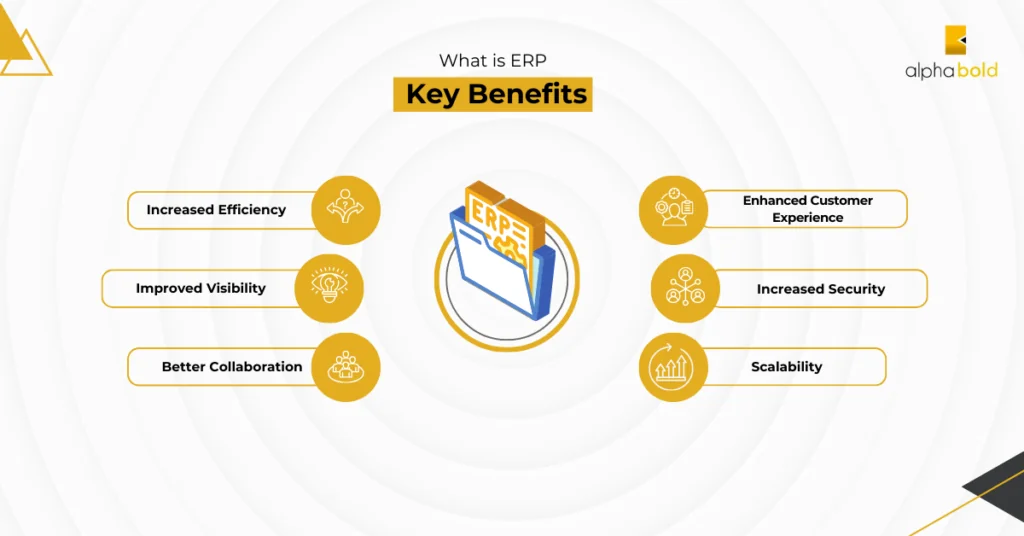Understanding ERP: What is ERP and How Does It Work?

Home » Blog » Project Management & Resource Planning » Understanding ERP: What is ERP and How Does It Work?
 alphabold
alphabold

In today’s fast-paced and dynamic business environment, companies seek ways to streamline their operations and gain a competitive advantage. This is where Enterprise Resource Planning (ERP) systems come into play. ERP software provides an integrated view of a company’s core business processes, often in real-time. This comprehensive guide will dive into the world of ERP, covering what it is, how it works, and its benefits for businesses.
At its core, ERP is a suite of integrated software applications that help businesses manage their core processes, such as finance, manufacturing, inventory, human resources, and customer relationship management (CRM). The purpose of understanding ERP systems is to provide a single, central repository for all business data, accessible to all departments, providing real-time insights, and automating key processes. ERP systems can be deployed on-premises or in the cloud, depending on the business’s needs. ERP software typically includes a range of modules, with each module responsible for managing a specific area of the business. For example, a finance module will manage all financial transactions and records, while a manufacturing module will handle production planning and scheduling. Each module can be used independently, but they are connected in a single integrated system providing one centralized view of the business.
ERP software collects and stores data in a single database, ensuring that data is consistent and up to date. This architecture streamlines business processes, provides real-time insights, and helps eliminate the need for manual data entry and management.
At its core, ERP centralizes the data from different departments of a business into a single unified system. This allows for better communication, decision-making, and operational efficiency across the entire organization. Here’s a breakdown of how it operates:
In conclusion, how does ERP work? By centralizing, integrating, and automating business processes, ERP systems enable organizations to operate more efficiently and make data-driven decisions. With its modular structure, scalability, and customization capabilities, ERP proves to be a versatile tool for businesses of all sizes.
Read More about ERP Software Comparison: Key Insights for Executives
Ready to revolutionize your business operations with NetSuite ERP? Partner with AlphaBOLD for expert NetSuite services tailored to your needs.
Request a DemoBy implementing an ERP system, your business can reap numerous benefits that will help you achieve your business goals.

One of the main benefits of an ERP system is increased efficiency. Instead of using multiple software applications and systems, an ERP system centralizes all your business operations into one platform. This allows easy access to important data, improving decision-making and collaboration between departments. Furthermore, an ERP system automates many manual tasks, such as data entry and reporting, reducing the risk of errors and freeing up time for your employees to focus on more critical tasks.
With an ERP system, you can gain better visibility into your business operations. You can monitor your inventory levels, sales performance, and financial metrics by having access to real-time data. This allows you to identify potential issues and make informed decisions to improve your business processes. Additionally, an ERP system can provide insights into your customer behavior and preferences, allowing you to tailor your marketing and sales strategies to meet their needs better.
Collaboration is critical to any successful business, and an ERP system can facilitate collaboration between departments. By centralizing all your business operations into one platform, employees from different departments can easily access the same data and communicate more efficiently. This leads to better coordination, increased productivity, and faster response times to customer inquiries.
Read more about Benefits of NetSuite ERP Platform for Growing Businesses
An ERP system can also improve the overall customer experience. You can respond to customer inquiries quickly and efficiently by having access to real-time data. Additionally, an ERP system can help you track customer behavior and preferences, allowing you to provide a more personalized experience. By using an ERP system to streamline your operations, you can ensure that your products and services are delivered promptly and consistently, increasing customer satisfaction and loyalty.
Data security is a significant concern for any business. An ERP system can help maintain data security by centralizing and encrypting sensitive information. This reduces the risk of data breaches and ensures that confidential information is protected. Additionally, an ERP system allows you to control access to sensitive information, limiting it to only those employees who need it.
As your business grows, it’s essential to have a system that can grow with you. As ERP defines highly scalable and can accommodate the changing needs of your business. Whether adding new products, expanding into new markets, or increasing your workforce, an ERP system can adapt to your changing needs, making it a long-term solution for your business.

Streamline your ERP selection process with our comprehensive checklist, ensuring you make informed decisions for your business's future success.
Learn more
Finance: This module manages financial transactions, including accounts payable and receivable, general ledger, and cash management. It also includes features for budgeting, forecasting, and financial reporting.
Human Resources: The HR module manages employee information, including payroll, benefits, attendance, and performance tracking. It also includes features for recruitment, training, and succession planning.
Supply Chain Management: This module manages the supply chain, including procurement, inventory management, and order fulfillment. It also includes demand forecasting, production planning, and supplier management features.
Manufacturing: The manufacturing module manages the production process, including scheduling, resource allocation, and quality control. It also includes features for product design, bill of materials, and work order management.
Customer Relationship Management (CRM): The CRM module manages customer data, including sales orders, marketing campaigns, and customer support. It also includes customer segmentation, lead tracking, and sales forecasting features.
Each of these modules can be customized and configured to meet the specific needs of a business. By integrating these modules into a single system, ERP provides a comprehensive view of the business and enables better-informed decision-making.
ERP and financials are related but distinct concepts in business management software. Financials is the software that manages a company’s financial transactions, such as accounts payable, accounts receivable, general ledger, and financial reporting. It typically includes modules for managing financial transactions, including financial statements, tax calculations, and billing. ERP, on the other hand, is a broader term that refers to a suite of integrated software applications that help organizations manage their core business processes, such as inventory and order management, production scheduling, human resources, and customer relationship management, in addition to financials.
Read more about NetSuite ERP: A Cost and ROI Guide for Executives
NetSuite is a cloud-based ERP system that provides advanced business functionality. It is a fully integrated platform that includes modules for financial management, supply chain management, inventory management, order management, customer relationship management, and e-commerce.
NetSuite is designed to be flexible and scalable, making it suitable for small and mid-sized businesses and large enterprises. NetSuite is also customizable, allowing companies to tailor the system to their specific needs. With its cloud-based architecture, NetSuite provides real-time access to data and enables users to access the system from anywhere with an internet connection.
Further Reading Why Choose NetSuite ERP to Improve Business Performance?
Additionally, NetSuite offers a variety of add-on modules and integrations, making it a powerful solution for businesses looking to streamline their operations and improve their overall efficiency.
Looking to enhance efficiency and productivity with ERP? Explore our comprehensive NetSuite solutions and take your business to new heights.
Request a DemoIn conclusion, ERP systems are an essential tool for modern businesses. They provide a comprehensive view of the business and allow for streamlined processes and improved decision-making. Integrating the various modules of an ERP system will enable businesses to automate many of their day-to-day operations, freeing up time and resources to focus on more strategic initiatives. With the emergence of cloud-based ERP systems like NetSuite, businesses of all sizes can take advantage of the benefits of ERP without the need for significant upfront investment or complex IT infrastructure. As technology continues to evolve, we can expect ERP systems to become even more advanced and more accessible. ERP systems thus are an increasingly valuable tool for businesses looking to stay competitive in a rapidly changing business environment.


